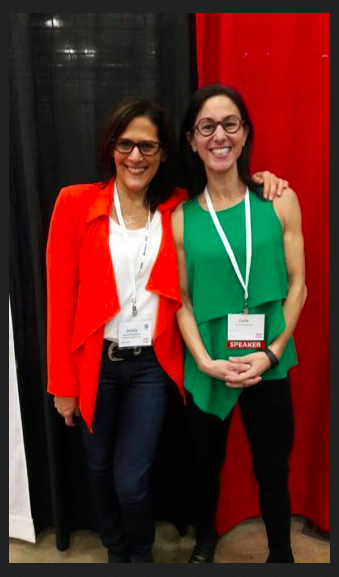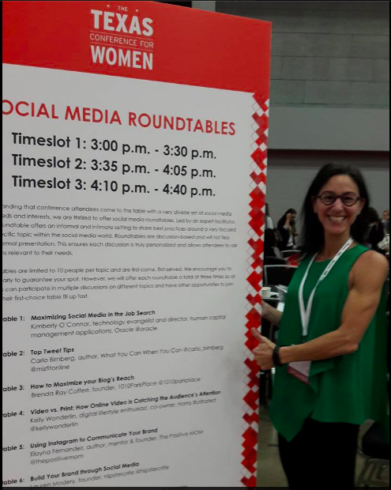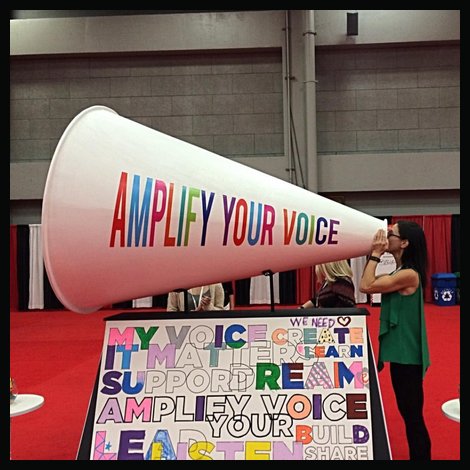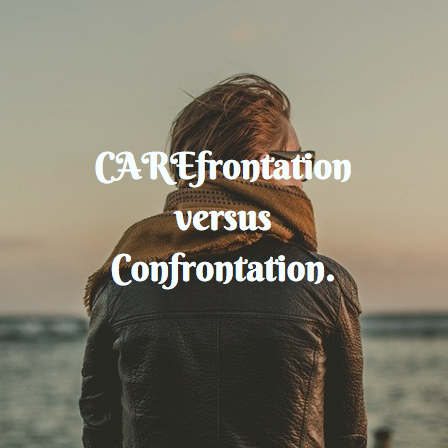
two grownups out on the conference circuit.
A few weeks ago I had the opportunity to speak at the Texas Conference for Women.
(Total life-goal bucket-list moment, but that’s a different post for another day.)
As I’d expected the women I met were inspiring, community-builders.
As I’d hoped Amal Clooney was an unbelievable speaker whose experiences helping women enslaved by ISIS left me awestruck and emboldened.
Even with all the phenomenal facets of the day, there’s one session which resonated with me above all else.
And, more specific than that, a singular phrase which lingers in my head all these weeks since the event passed.
But I’m getting ahead of myself.
In fact, backing waaay up, it’s crucial to clarify my aversion for confrontation.
I choose to believe we all dislike it mainly because I cannot fathom someone enjoying scenarios where disagreement occurs in hostile, angry ways.

(flash-forward and back to the conference)
I attended a session with Lisa Nichols (coach and international speaker) and, during her presentation, latched on to a ‘throw away’ phrase in the talk.
As Lisa detailed for us an experience she’d had she said: “I chose CAREfrontation over confrontation.”
She continued on to the crux of her story–I remained firmly focused on her 3 words:
CAREfrontation over confrontation.
I knew, if I gleaned nothing else from the day, what she’d casually uttered was everything I never knew I always wanted to hear.

The event continued. I talked, networked, laughed and presented and yet her phrase percolated in the back of my mind.
I can’t evolve or grow without confrontation.
I need to learn how to engage in productive confrontation–something I now possessed a word for: CAREfrontation. CAREfrontation would lay foundation for margins, facilitate differing, non-combative opinions, and result in healthier decision making.
I need to acquire the art of CAREfrontation in order to thrive and feel connected.
The conference continued. I forged new bonds with old friends as I concurrently created a mental framework for how I’d move toward CAREfrontation and stop avoiding the confrontation I’ve historically resisted.

1. Prepare.
When it came to confrontation I needed to plan. I needed to practice what I wanted to convey so as not to get lost in the emotions of the moment. I needed to pause and identify core issues so as not to get distracted by minutiae and ‘lose my listener.’
I needed to consider what language which best resonated with the other person(s) and use that even if it wasn’t intuitive for me.
I needed to identify an ideal resolution of the CAREfrontation and not use the interaction aimlessly ramble or vent.
I needed to own my part in the story. I needed to focus on I-sentences and not you-statements.
I needed to visualize the other person’s emotional reactions, body-language, and word choices and use those to ‘see’ a positive outcome and my responding with care not frustration.
I needed to plan a follow-up with the other person(s)/our connections to each other as the more I considered care over confront it grew evident follow-up was where the former revealed itself.
2. Environment.
Once I’d prepared it was incumbent upon me to really consider the where of my CAREfrontation. Too often, as a direct result of my dreading the interaction, I’d ruminate for a w-h-i-l-e over a confrontation and then seemingly (to the other person) spontaneously/apropos of nothing blurt everything out at once and in public.
As with other interactions in my life, I needed to place myself in the position of the other. I needed to consider environmental impact on interpersonal interactions and consciously choose a calm, supportive environment in which to CAREfront.
3. Believe.
Previously I’d entered into confrontations with an attitude of Well, if this doesn’t work at least I’ll feel better! My brain believed the story I told it and too often that’s exactly what happened. I vented. The other person didn’t say much. I felt fleetingly better (and then much worse) because it had been a confrontation-go-awry.
I needed to enter with care and with a knowing the other person desired resolution as much as I did. I couldn’t be too tightly attached to what the outcome would look like, yet I needed to believe there existed solutions, alternatives and compromises.
Changing from a mindset of Perhaps after arguing we’ll reach a compromise. to a belief in the idea of A focus on what we individually want/need can create a compromise we’re both happy with! shifted everything from my body language to my word choice.
Carefrontation conveyed I was invested, dedicated, and committed.
Soon after the conference (not to my surprise given the way my world works) I encountered a job situation which necessitated I confront a co-worker.
A scenario which, before Lisa’s three wise words, I’d have avoided until it exploded and tiptoed in later in an attempt to clean up the mess.
This time I chose a different approach.
I planned, I staged, I believed our communication would result in a new, clearer path—and it did.
And you?
- Are you a confrontation-hater as I was? Do you believe confrontation always equates to argument?
- Had you heard the word CAREfrontation? Have you ever put this approach into practice?
 Bea says
Bea says
December 5, 2016 at 4:32 amI’ve spent the majority of my life avoiding confrontations. My fear of them manifests in physical symptoms it’s so bad.
:/
 Rita says
Rita says
December 5, 2016 at 5:18 amI haven’t heard this word before, and avoid confrontation like you do.
I think my downfall is wearing about arguments and thinking in the end it won’t help anyway.
For me the last part, believe, would be the most important to change.
 Susie @ SuzLyfe says
Susie @ SuzLyfe says
December 5, 2016 at 5:27 amA beautiful distinction, and a great way to re-set the mindset for going into those types of situations. We are in such an inflammatory environment right now–everyone is just waiting to blow–that if people thought about carefrontations instead of confrontations, we might have ended up with a very different result a month ago.
 Allie says
Allie says
December 5, 2016 at 6:26 amI’m terrified of confrontation but, over the years have MADE myself do it. Turns out, that I already practiced a sort of CAREfrontation since that is the only way I think I can approach a situation like that. No one wants to feel attacked and therefore, defensive. I always approached confrontation a little timid (probably too much) and try to convey the feeling of good intention instead of dumping all over you. I love that you have now given me a word for it.
And, for me, the most important piece of my puzzle is not getting emotional!!! Go figure 🙂
Love this so much and would love to see you speak someday!!
 Coco says
Coco says
December 5, 2016 at 6:26 amDefinitely a confrontation-avoider here. Hadn’t thought of carefrontation as such, but I think as my kids got older parenting took a turn in that direction.
 messymimi says
messymimi says
December 5, 2016 at 6:45 amTalking things through with an attitude toward creating a better future is a lot better than the simple venting i sometimes want to do. When i remember that, it works.
 Leanne@ www.crestingthehill.com.au says
Leanne@ www.crestingthehill.com.au says
December 5, 2016 at 7:25 amI hate confrontations – they leave me shaky and stressed. I particularly hate them when it’s a bully type personality I have to deal with. I like your approach Carla and will have to look into being more proactive in my Carefrontations from now on!
 Shari Eberts says
Shari Eberts says
December 5, 2016 at 7:59 amI don’t mind confrontations as much as it sounds like you do, but adding a caring element into them makes a lot of sense to me. Thanks for sharing what you learned.
 Paula Kiger says
Paula Kiger says
December 5, 2016 at 8:05 amAs you know I have a big interest in this word! And yes, oh yes, I avoid confrontation like the plague. I grew up in a house with NO YELLING. And while I am not advocating lots of yelling, it’was just a home which, while very loving, had very few examples of how to deal with conflict constructively. I’m still fighting the tendency to “just take it” in many areas of my life. The carefrontation model is definitely helpful. // IN ADDITION, having a 20 year old daughter, I see the challenges women of that age faces (not to overgeneralize but many/most of them) in dealing with conflict face to face. They send each other scathing and cruel text messages, then wonder why feelings are hurt and problems can’t be resolved. We owe our young women better models of how to deal with confrontation, and CAREfrontation is definitely a good one.
 Elle says
Elle says
December 5, 2016 at 8:30 amI have never been one to avoid a confrontation. I believe we learn and grow from them. In my family we discussed everything and generally disagreed about everything but we did it with respect and clarity and it was never personal or hurtful.
In my adult relationships I still do not avoid confrontation, but I am more careful to choose where I spend my energy. Some things do not matter. When something does matter, I move forward and keep my ears and eyes open wider than my mouth.
 Haralee says
Haralee says
December 5, 2016 at 8:42 amI like this and I think it would work well within families during Holidays or various family occasions when someone spills accusations and pent up childhood slights. I think you outlined excellent tools in preparing for confrontations and carefrontations.
 Tamara says
Tamara says
December 5, 2016 at 8:45 amOh man. I needed to have read this yesterday!
 Sarah K says
Sarah K says
December 5, 2016 at 9:19 amI am also very conflict averse. Have you ever heard of the Enneagram? It’s a personality typing system and one of the types (9) as this as its core issue – the need to keep the peace at all costs… generally denying one’s own wants and needs in the process. I’m fairly confident that is my type and it might be yours too. A lot of smart people have written books about the Enneagram and I’ve found it really helpful to learn how to break that cycle of conflict avoidance (although I will admit, it’s still a work in progress.) I love the concept of a CAREfrontation… sometimes its care for others, sometimes its because you care for yourself and need to be assertive.
 AdjustedReality says
AdjustedReality says
December 5, 2016 at 12:04 pmI love this. I’ve never put words to it, but I think that’s what I aim to do, at least. I’m not a huge fan of confrontation, but managing a bunch of people, it happens, and sometimes you have to dive in to solve problems. It seems to go better when you go in rational and keep your emotions in check, and concentrate on facts rather than abstract feelings. That’s what I try to pull out of my people too. If you just need an ear to vent to, that’s fine (to a point), but if you want me to actually help you resolve an issue, I need us to concentrate on rational thought and reasonable conclusions.
 Erin @ Erin's Inside Job says
Erin @ Erin's Inside Job says
December 5, 2016 at 2:29 pmConfrontations are always such a tricky thing. I love this and hope more people practice it!
 Glenda says
Glenda says
December 5, 2016 at 3:53 pmBeing in the “right” spirit is so important when I need to confront. When this occurs, I’m prepared and the receiver listens without the attempt to argue. Lisa Nichols is a powerful speaker. I love CAREfrontation. Great post.
 Jody - Fit at 59 says
Jody - Fit at 59 says
December 6, 2016 at 3:06 pmLOVE this Carla!!!!!!!!!!!!!!!!!!!!!!!! I never liked confrontations. On top of that, my personal fragile internal self always felt not enough when confrontations were not carefrontations.. so much to think about before we speak.
 Lana_SHON says
Lana_SHON says
December 10, 2016 at 4:35 pmReally great!